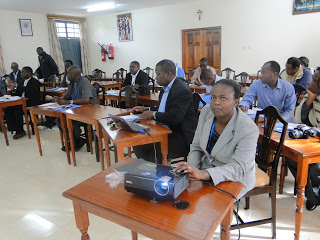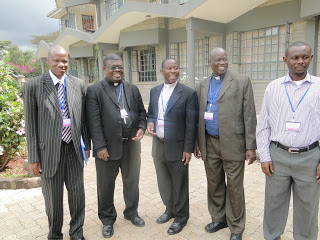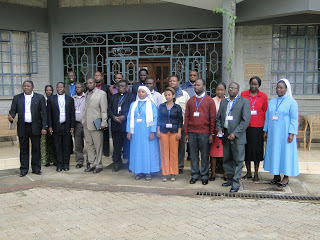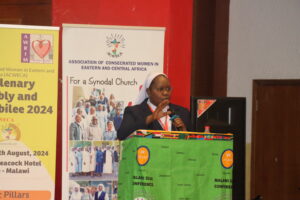AMECEA: Communicators commit to the implementation of “Africae Munus” -Papal Document

 |
| A cross section of workshop delegates during the sessions |
Participants of the Africae Munus AMECEA Social Communications workshop
have determined to use mass and social media networks in the region to bring
awareness, promote and implement the Papal document in the AMECEA
region.
have determined to use mass and social media networks in the region to bring
awareness, promote and implement the Papal document in the AMECEA
region.
Expressing their view at the end of the workshop which began 21st
May 2012 and ended on 25th May 2012 participants also set to
collaborate with other departments and the entire secretariat at their
respective conferences in ensuring that the document is known and reaches to
the parish level.
 |
| Some of the Workshop Delegate with Bishop Chair for Communicatio |
In his opening speech, Rt. Rev. Charles Kasonde,
the bishop chairman for AMECEA Social Communication explained that AMECEA
Social Communications department has a responsibility to strategize on new
approaches of networking, mutual collaboration and actions of solidarity among
AMECEA media practitioners in order to bring awareness of the document and
address the challenges facing their pastoral ministry as expressed in the
document.
the bishop chairman for AMECEA Social Communication explained that AMECEA
Social Communications department has a responsibility to strategize on new
approaches of networking, mutual collaboration and actions of solidarity among
AMECEA media practitioners in order to bring awareness of the document and
address the challenges facing their pastoral ministry as expressed in the
document.
In his presentation titled Evangelizing the World
of Information, Technology and Communications: A Pastoral Challenge, Rev. Dr.
Segeja Nicholaus, Head of Department of Pastoral Theology at the Catholic
University Of Eastern Africa CUEA, told the workshop delegates that the
tremendous increasingly use of the media is affecting all, both in positive and
negative ways and the most are the youth (Generation – Gen “Y”). He added that
the modern mass media are not only instruments of communication, but also a
world to be evangelized which eventually brings about at least two implications
namely, the right understanding of the reality of communication and the use of
the media so that it propagates the good, the true and the beautiful. He also
said that Africae Munus calls it authentic communication
(AM, 142-146, Caritas in Veritate, 73) which should be a priority in Africa –
Hence should include four integral dimensions, namely, building of community,
koinonia; witness to the truth, matyria; diakonia; and reverence and the sense
of the sacred, liturgia.
of Information, Technology and Communications: A Pastoral Challenge, Rev. Dr.
Segeja Nicholaus, Head of Department of Pastoral Theology at the Catholic
University Of Eastern Africa CUEA, told the workshop delegates that the
tremendous increasingly use of the media is affecting all, both in positive and
negative ways and the most are the youth (Generation – Gen “Y”). He added that
the modern mass media are not only instruments of communication, but also a
world to be evangelized which eventually brings about at least two implications
namely, the right understanding of the reality of communication and the use of
the media so that it propagates the good, the true and the beautiful. He also
said that Africae Munus calls it authentic communication
(AM, 142-146, Caritas in Veritate, 73) which should be a priority in Africa –
Hence should include four integral dimensions, namely, building of community,
koinonia; witness to the truth, matyria; diakonia; and reverence and the sense
of the sacred, liturgia.
 |
| Rt. Rev Bernardini Mfumbusa of Kondoa Diocese. Tanzania during his presentation |
Rt. Rev. Dr. Bernardin Francis Mfumbusa, Bishop of
Kondoa Diocese in Tanzania who presented the topic The Missionary Mandate in
Our Times, pointed out that based on statistics, Facebook, a common social
network for instance boasts of 800 million users, with people spending 700
billion minutes per month and a user spending an average 15 hours & 33
minutes a month on the site, while 30 billion pieces of content is shared on
Facebook each month; yet the Church is lagging in the use of new media
technologies for evangelization; and the reasons being the following: the
nature of new media technologies; the church is no longer a leader in
education/research sector and the skills required viz. multi-tasking etc.
Kondoa Diocese in Tanzania who presented the topic The Missionary Mandate in
Our Times, pointed out that based on statistics, Facebook, a common social
network for instance boasts of 800 million users, with people spending 700
billion minutes per month and a user spending an average 15 hours & 33
minutes a month on the site, while 30 billion pieces of content is shared on
Facebook each month; yet the Church is lagging in the use of new media
technologies for evangelization; and the reasons being the following: the
nature of new media technologies; the church is no longer a leader in
education/research sector and the skills required viz. multi-tasking etc.
He added that the following should be issues of
concern for the Catholic Communicators:
concern for the Catholic Communicators:
– How to Reach Gen Y?
– How to counteract religion related negativity?
– – How to deal with the banalization of religious
symbols?
symbols?
– Limited presence of Catholic content in social
media.
media.
 |
| Workshop Participants Group Photo |
Other topic covered during the workshop included
Social Media – Facebook and the blog at the service of the world and in this topic;
delegates were intensively informed of the meaning of social media; examples of
social media and the social media landscape. Concerning Facebook, the main
focus was about major social features of Facebook, other features of Facebook,
Facebook as a media for new youth Evangelization, why Facebook is so strategic
for Evangelization and why Facebook is so popular. Other aspects of Facebook
which the delegates were informed of included Facebook’s political and social
impacts, negative effects of Facebook in regards to spiritual impact, Facebook
etiquette, Facebook privacy and the future of Facebook. In regards to blogs,
delegates were informed of the reasons why blogs are popular; how the Church
can use the blogs to evangelize; disadvantages of blogging; blogging etiquette
and future of blogs.
Social Media – Facebook and the blog at the service of the world and in this topic;
delegates were intensively informed of the meaning of social media; examples of
social media and the social media landscape. Concerning Facebook, the main
focus was about major social features of Facebook, other features of Facebook,
Facebook as a media for new youth Evangelization, why Facebook is so strategic
for Evangelization and why Facebook is so popular. Other aspects of Facebook
which the delegates were informed of included Facebook’s political and social
impacts, negative effects of Facebook in regards to spiritual impact, Facebook
etiquette, Facebook privacy and the future of Facebook. In regards to blogs,
delegates were informed of the reasons why blogs are popular; how the Church
can use the blogs to evangelize; disadvantages of blogging; blogging etiquette
and future of blogs.
There was also the topic of The Priest and Pastoral
Ministry in a Digital World with the main focus on YouTube; what is a YouTube; Why
YouTube is More Popular than Google Video and YouTube etiquette
Ministry in a Digital World with the main focus on YouTube; what is a YouTube; Why
YouTube is More Popular than Google Video and YouTube etiquette
At the end of the workshop, delegates were able to
come up with the following resolutions:
come up with the following resolutions:
1. There
will be an officially launch Africae Munus in all national conferences to aid
in popularize the document and signal official start of implementation. Those
to be involved include National Communications Office; AMECEA Conferences
Secretaries General’s office; Caritas –Justice and Peace and Pastoral
departments. They should organize suitable date for launch, organize activities
and then launch. This was resolved to take place by the end of the year 2012.
will be an officially launch Africae Munus in all national conferences to aid
in popularize the document and signal official start of implementation. Those
to be involved include National Communications Office; AMECEA Conferences
Secretaries General’s office; Caritas –Justice and Peace and Pastoral
departments. They should organize suitable date for launch, organize activities
and then launch. This was resolved to take place by the end of the year 2012.
2. Formation
of national Africae Munus steering committees or task force
groups to co-ordinate activities and avoid parallel programs and duplication.
This is to be done by National Communications Office; Secretary General’s
office; Caritas –Justice and Peace and Pastoral departments. The National
Communications office to lobby Secretary General’s office, Caritas and Pastoral
offices at Catholic Secretariat to create committees and this should be done by
end of June 2012.
of national Africae Munus steering committees or task force
groups to co-ordinate activities and avoid parallel programs and duplication.
This is to be done by National Communications Office; Secretary General’s
office; Caritas –Justice and Peace and Pastoral departments. The National
Communications office to lobby Secretary General’s office, Caritas and Pastoral
offices at Catholic Secretariat to create committees and this should be done by
end of June 2012.
3. The
Design AMECEA blog on Africae Munus activities in the region to
increase knowledge sharing and best (good) practices. This to be done by AMECEA
Communications office and the National Communications departments. The AMECEA
Communications office to design and launch the blog and regularly update it;
while the National Communications departments to regularly contribute to the
blog. This should be done by end of June 2012.
Design AMECEA blog on Africae Munus activities in the region to
increase knowledge sharing and best (good) practices. This to be done by AMECEA
Communications office and the National Communications departments. The AMECEA
Communications office to design and launch the blog and regularly update it;
while the National Communications departments to regularly contribute to the
blog. This should be done by end of June 2012.
4. Distribute
soft copies of simplified version of Africae
Munus to increase dissemination via
internet and social media; simplified version to ensure easy understanding of Africae Munus issues. The task is to be
performed by AMECEA Communications office and Nation Communication Departments.
The AMECEA Communications office to distribute Africae Munus soft copy to
National Communications Departments who in turn to share Africae Munus soft copy document widely. This is to be done by July
2012.
soft copies of simplified version of Africae
Munus to increase dissemination via
internet and social media; simplified version to ensure easy understanding of Africae Munus issues. The task is to be
performed by AMECEA Communications office and Nation Communication Departments.
The AMECEA Communications office to distribute Africae Munus soft copy to
National Communications Departments who in turn to share Africae Munus soft copy document widely. This is to be done by July
2012.
5. Know
about and document Africae Munus activities being carried out by
other departments at national level to retain experiences of activities being
carried out. This is to be done by the National Communications Departments who
are to make inquiries from other departments about Africae Munus programs;
other departments are supposed to share their plans with National
Communications office and this should be an ongoing process throughout
2012-2013.
about and document Africae Munus activities being carried out by
other departments at national level to retain experiences of activities being
carried out. This is to be done by the National Communications Departments who
are to make inquiries from other departments about Africae Munus programs;
other departments are supposed to share their plans with National
Communications office and this should be an ongoing process throughout
2012-2013.
6. Bring
about the importance of social media as a new tool for evangelization in order
to explore new ways of spreading the Gospel and the message of Africae Munus and to reach the youth; build capacity among Catholic media
practitioners. This task is to be performed by the National Communication
departments with the help from AMECEA Communications Office through conducting
workshops on social media for diocesan communication offices and diocesan
media. This will be an ongoing program.
about the importance of social media as a new tool for evangelization in order
to explore new ways of spreading the Gospel and the message of Africae Munus and to reach the youth; build capacity among Catholic media
practitioners. This task is to be performed by the National Communication
departments with the help from AMECEA Communications Office through conducting
workshops on social media for diocesan communication offices and diocesan
media. This will be an ongoing program.
7. Reach
out to journalists especially Catholic journalists working for secular media to
increase effectiveness of Church communications. The task is to be performed by
AMECEA Communication Office and the National Communications Departments by visiting
secular media houses to familiarize with their operations; bring them on board
(secular media); also suggested is the formation of Catholic media
associations. This should also be an ongoing program.
out to journalists especially Catholic journalists working for secular media to
increase effectiveness of Church communications. The task is to be performed by
AMECEA Communication Office and the National Communications Departments by visiting
secular media houses to familiarize with their operations; bring them on board
(secular media); also suggested is the formation of Catholic media
associations. This should also be an ongoing program.
8. The
message of Africae Munus to be constantly featured in all Church media to
continuously educate and remind people about the importance of the Africae
Munus message. This is to be done by Catholic media houses in AMECEA. AMECEA
Communications office and National Communication Department to encourage
Catholic media to produce radio and television programs and to write articles. Africae Munus programs should be in multimedia and this is to be an ongoing
program.
message of Africae Munus to be constantly featured in all Church media to
continuously educate and remind people about the importance of the Africae
Munus message. This is to be done by Catholic media houses in AMECEA. AMECEA
Communications office and National Communication Department to encourage
Catholic media to produce radio and television programs and to write articles. Africae Munus programs should be in multimedia and this is to be an ongoing
program.
9. Counter
negative media publicity towards the Church to enhance Catholic faith as a
positive and worthy lifestyle. This is to be done by AMECEA Communications
office and National Communications Department who are to lobby Bishops to
appoint spokespersons of each conference; there should also be workshops for
clergy to handle media and engage Catholic journalists working for secular
media. This is to be an ongoing activity.
negative media publicity towards the Church to enhance Catholic faith as a
positive and worthy lifestyle. This is to be done by AMECEA Communications
office and National Communications Department who are to lobby Bishops to
appoint spokespersons of each conference; there should also be workshops for
clergy to handle media and engage Catholic journalists working for secular
media. This is to be an ongoing activity.
10. Make
Catholic media houses attractive to work for in order to enhance quality
productions and bring about professionalism. This activity is to be performed
by the AMECEA Communications office and the National Communication Departments
and it will be an ongoing activity.
Catholic media houses attractive to work for in order to enhance quality
productions and bring about professionalism. This activity is to be performed
by the AMECEA Communications office and the National Communication Departments
and it will be an ongoing activity.
11. Review
implementation plan to re-align activities and make this plan more effective.
This is to be done by AMECEA Communications Office and the National
Communications Departments at the annual meeting of National Communication
Directors to be held in August 2012.
implementation plan to re-align activities and make this plan more effective.
This is to be done by AMECEA Communications Office and the National
Communications Departments at the annual meeting of National Communication
Directors to be held in August 2012.
The workshop was organized by AMECEA Social Communications department and was funded by USCCB Catholic Communication Campaign.
Source: AMECEA Social Communications Office


